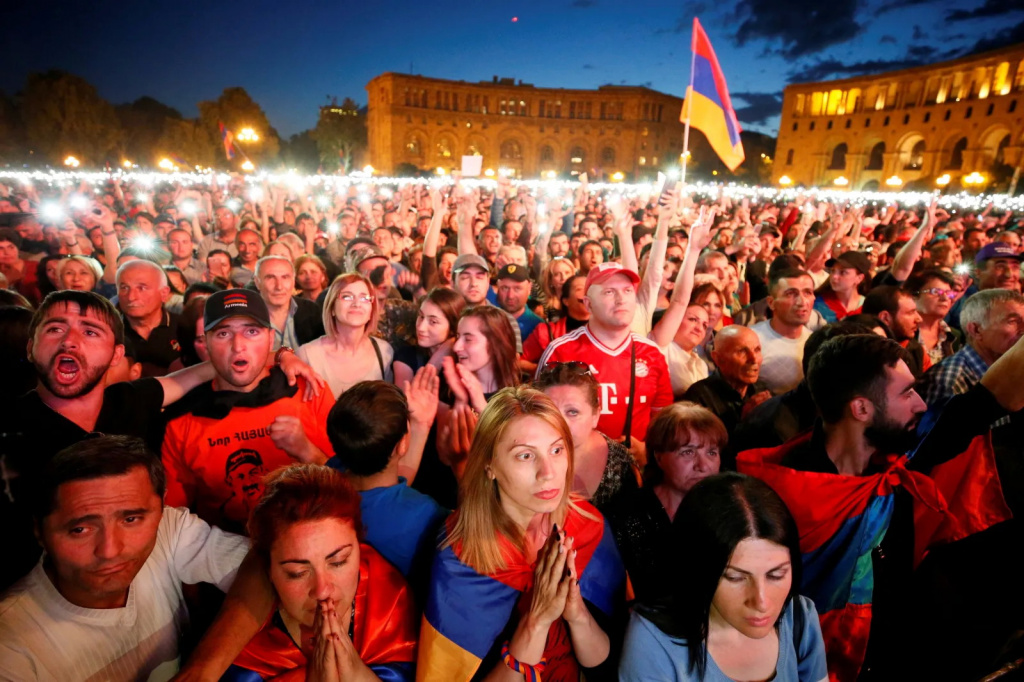A Reaction and a Reasoning of Georgian Political Establishment’s Backlash on Velvet Revolution in Armenia
In
Log in if you are already registered
The text was written for an international conference entitled “Armenia and Armenians at Turning Points in the World History (History and Modernity)”, Yerevan, Armenia, September 19-20.2023.
Velvet Revolution in Armenia has triggered various actors all around the world, some hoping that it may even change the country’s geopolitical preferences, for example, letting the US-led Western world to include Yerevan into Eastern Partnership club. But nowadays, despite Nikol Pashinyan’s open criticism toward Russia, Moscow’s arguably minor role in supporting strategic ally during the Second Nagorno Karabakh war it became obvious that existing political, social, economic and geopolitical disposition keeps pre-existed status-quo: Russia in, the West out, Armenia and Azerbaijan on the brink of yet another military confrontation.

Source: Reuters
The Reaction
Taking this into consideration it is highly interesting how another South Caucasian state, Georgia, reacted on the processes? Analyzing an overall reaction of Georgian political establishment as well as a local academia, professor Ghia Nodia argued that no one actually expected any kind of revolution in the neighboring Armenia. Moreover, no serious research was conducted on the social and political movements in the state. This led Georgian scholar to assume that Tbilisi is actually detached from processes in the region. No one really cares about political, social and economic shifts in the neighboring states due to total focus on the so-called Western world, Tbilisi’s personal aspirations to finally become a member of the “civilized world”, “European family”.
Thus, we can argue that Georgian political establishment was surprised by processes in Armenia. On the one hand, local government led my Georgian Dream being actually passive, waiting for final power distribution to continue maintaining the “brotherhood nation concept”. On the other hand, Georgian political opposition (especially, the United National Movement) showed more willingness to participate in the processes, some even arguing that it is time for Georgian pro-Western powers to help “Armenian brothers” to liberate from Russian influence. Even Mikhail Saakashvili expressed a will to help Nikol Pashinyan build “new, modernized, pro-Western” Armenia. But these aspirations fell short when it became clear that the new wave of democratic liberation, meaning deconstruction of the Soviet-past and build-up of new pro-Western society with anti-Russian sentiments was impossible to implement. No new group of Georgian revolutionist-reformers was expected in Yerevan as it happened after the so-called Euromaidan in Ukraine. As a result, Georgian government simply waited the new political elites to be formed in Armenia to move on, while Georgian opposition forgot about it soon after. Processes in Armenia were merely at the table of Georgian political establishment at that time. Nowadays, Tbilisi is focused on its “historical goal” again – acquiring EU candidate status.
The Reasoning
To understand reasons behind such negligence from Georgian political elites, and not only, toward the processes in Armenia, generally in the South Caucasus, we should remember that the so-called Rose Revolution (2003) managed to initiate both, nation-building as well as state-building shifts in Tbilisi. The post-Soviet elites (political, social, economic, business, academic) in the country were deconstructed that also led to total abandonment of those ties that previously existed. The newly formed pro-Western elites were mainly focused on what they perceived as “historical goal” of the nation – to become member of the Western world, meaning integration to NATO and EU. Thus, Tbilisi experienced a move from the post-Soviet space to an area politically and economically dominated by the West; for example, USA, EU member states and Ukraine. The same changes took place at Georgian universities and academia. Armenia as a strategic ally of Russia as well as other states, for example, in the Central Asia simply fell out. This detachment from non-West-oriented states/regions grew over the years and caused a significant gap between Georgian elites and the rest of the majority of neighboring states. We may firmly argue that current communication between Georgian and Armenian political elites, including academia, heavily rely on US/EU-funded programs and/or interpersonal initiatives. By and large, decision-makers in Tbilisi are focused only on those countries/areas that are in interest of the West; and Yerevan becomes a subject of a concernment in cases when it confronts Moscow and raises possibility of Armenian-Russian strategic split up. In this scenario, it is being considered by the so-called pro-Western Georgians as a new opportunity for the Western expansion.
Founder of the SIKHA Foundation, lecturer at the Tbilisi State University
Blog: Archil Sikharulidze's Blog
Rating: 0




